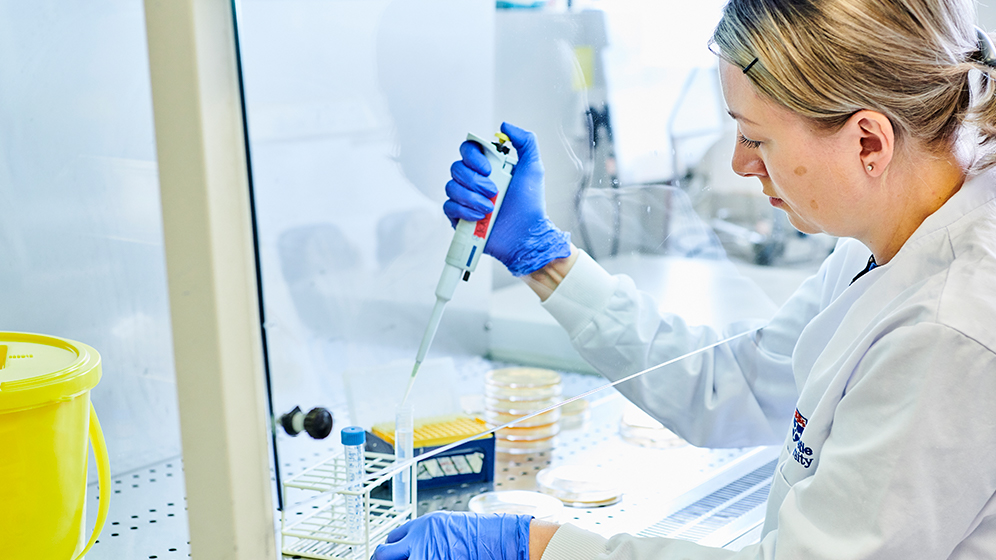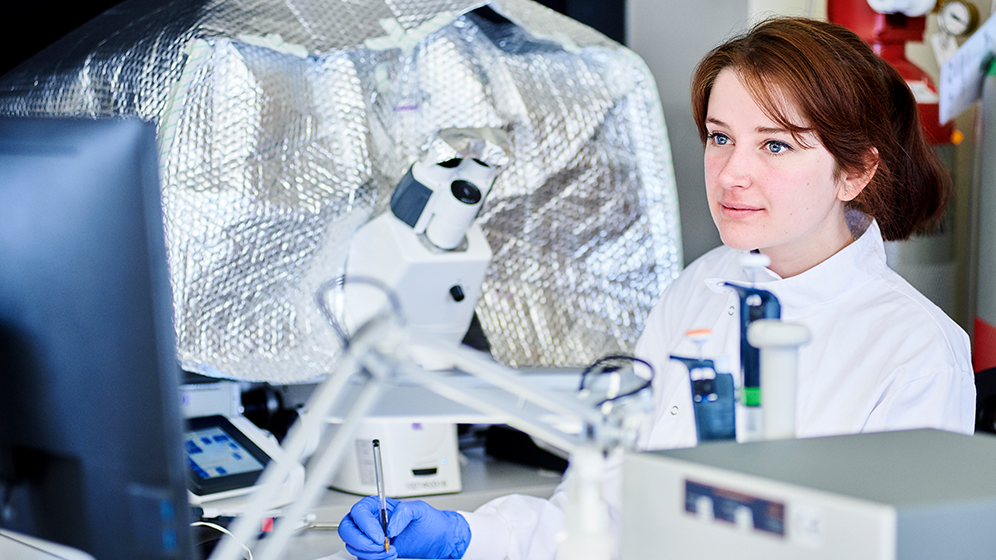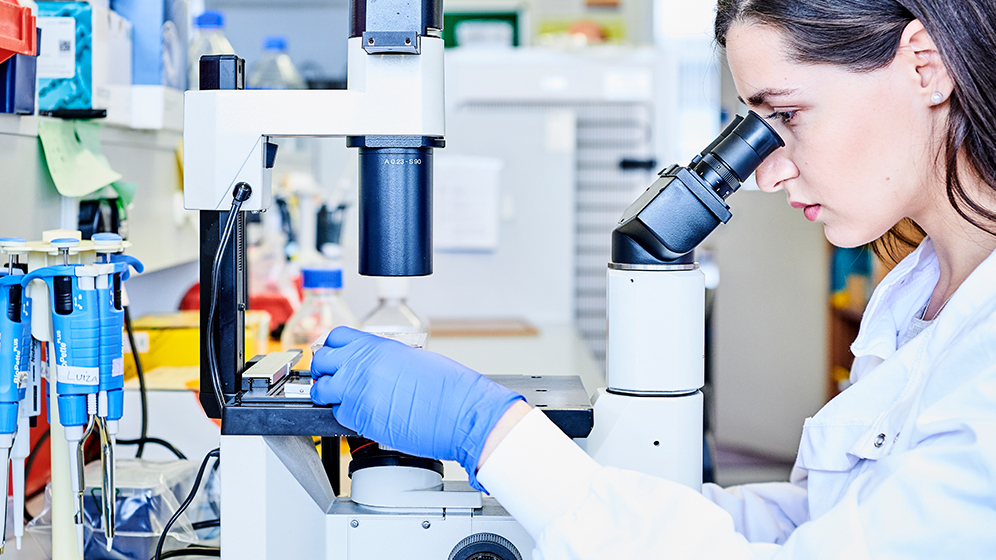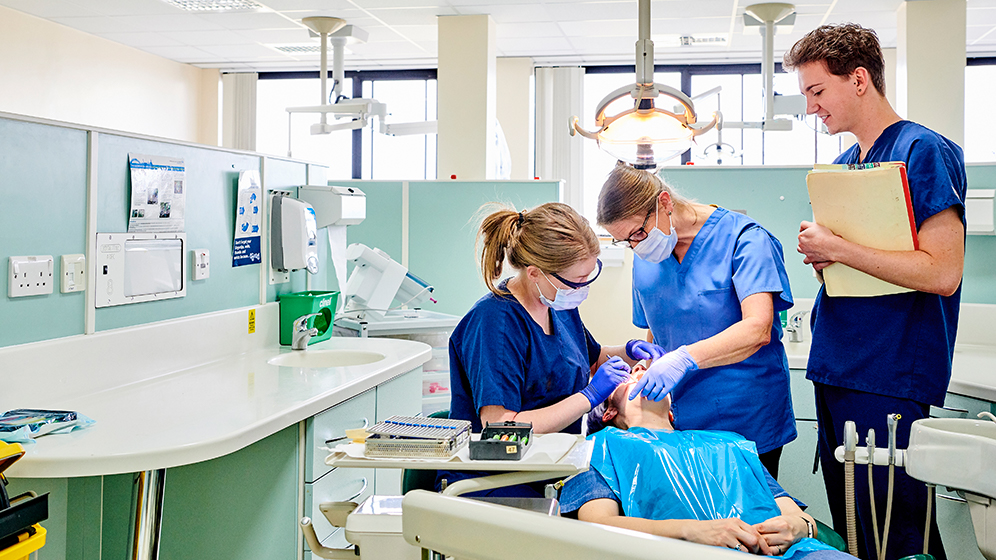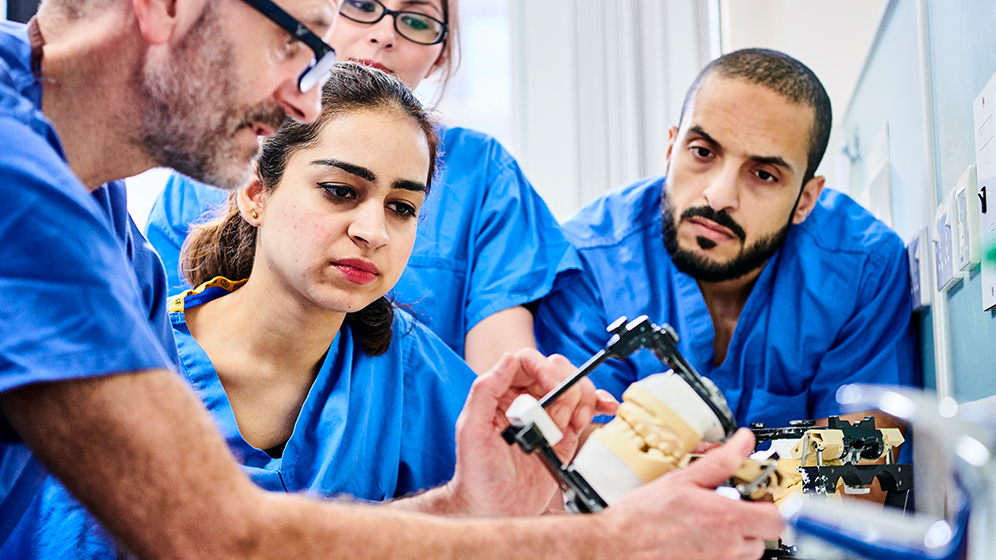Dental Therapy BSc Honours
- UCAS code: A207
- Full time
- 3 years
Prepare for a career as a caring and competent dental therapist benefiting from research-led teaching in world-class facilities.
You are currently viewing course information for entry year: 2026
Next start date:
- September 2026
UCAS Institution name and code:
- NEWC / N21
Course overview
Our students are helping transform the oral health of local communities. You'll help patients avoid and manage oral disease by promoting good oral health and providing treatments. This degree will provide you with the practical, theoretical and professional skills required for this role.
At Newcastle our work has worldwide impact and you'll be taught by some of the top academics and internationally renowned experts in their field.
This degree begins with a foundation in biomedical sciences, providing a basis for clinical work as the course progresses. You'll study advanced topics such as human disease, managing medical emergencies, and health promotion.
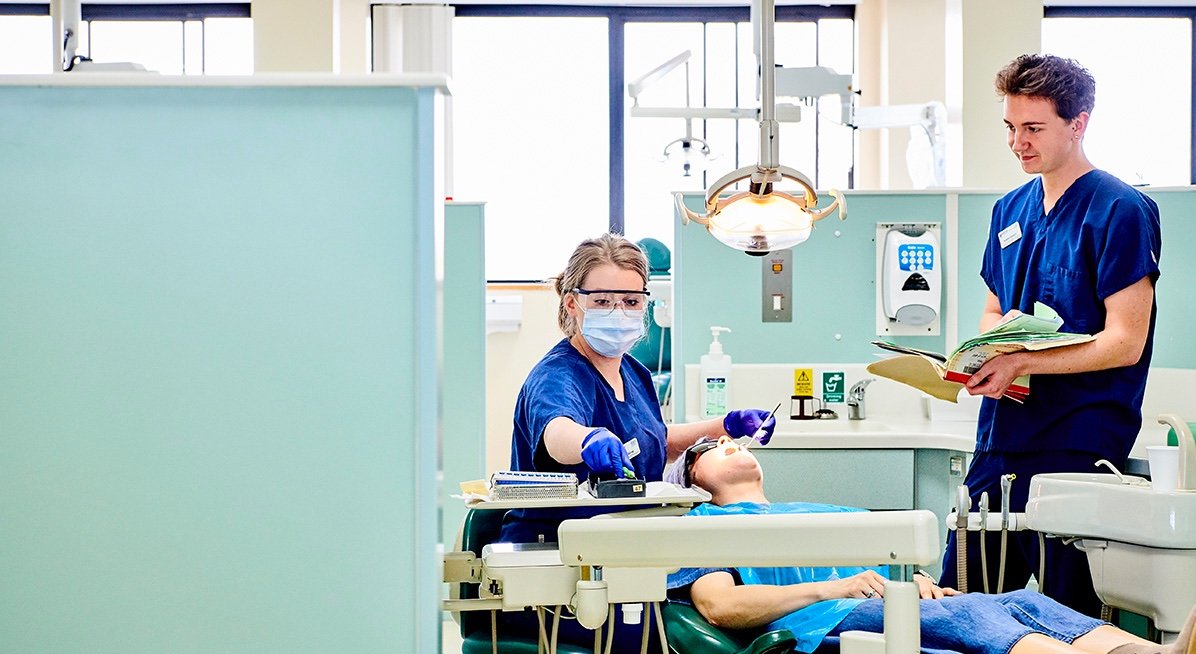
Your course and study experience - disclaimers and terms and conditions
Please rest assured we make all reasonable efforts to provide you with the programmes, services and facilities described. However, it may be necessary to make changes due to significant disruption, for example in response to Covid-19.
View our Academic experience page, which gives information about your Newcastle University study experience for the academic year 2025-26.
See our terms and conditions and student complaints information, which gives details of circumstances that may lead to changes to programmes, modules or University services.
Quality and ranking
Professional accreditation and recognition
All professional accreditations are reviewed regularly by their professional body.
Modules and learning
Modules
The information below is intended to provide an example of what you will study.
Most degrees are divided into stages. Each stage lasts for one academic year, and you'll complete modules totalling 120 credits by the end of each stage.
Our teaching is informed by research. Course content may change periodically to reflect developments in the discipline, the requirements of external bodies and partners, and student feedback.
Optional module availability
Student demand for optional modules may affect availability.
Full details of the modules on offer will be published through the Programme Regulations and Specifications ahead of each academic year. This usually happens in May.
To find out more please see our terms and conditions
In first year you will study a range of subjects which provide a foundation for clinical work in later stages.
Topics include: aetiology; physiology; pathology and presentation of oral disease; dental, oral, and craniofacial anatomy; behavioural science and communication; basic pharmacology; and dental materials science.
You'll also cover study skills, evidence-based practice, critical appraisal of research, infection transmission and control, professionalism and ethics, health and safety, and medico-legal considerations. You'll begin to learn clinical skills during term 3, in a simulated clinical environment using manikins.
Please note that there are no optional modules for this course.
You'll begin to develop your clinical practice, which begins with an intensive clinical introductory course and continues with clinical attachments to a variety of clinics within the Newcastle Dental Hospital.
During the clinical attachments, you'll learn specific skills relating to patient assessment, such as clinical examination and history taking.
Running alongside the clinical attachments is lecture-based teaching in:
- human diseases and the management of medical emergencies
- pharmacology
- aspects of dental health education
- health promotion and disease prevention education
- diet and nutrition
- clinical investigations
- treatment plan delivery
- professional standards and expectations
You'll experience more varied clinical attachments, extending your experience and enhancing your clinical practice.
You'll attend restorative and paediatric diagnostic clinics and develop enhanced skills, for example, in:
- diagnostic skills
- radiography
- management of patient anxiety
- extraction of the primary dentition
We base these figures and graphs on the most up-to-date information available to us. They are based on the modules chosen by our students in 2024-25.
Teaching time is made up of:
- scheduled learning and teaching activities. These are timetabled activities with a member of staff present.
- structured guided learning. These are activities developed by staff to support engagement with module learning. Students or groups of students undertake these activities without direct staff participation or supervision
An optional elective period at the end of Stage 2 gives you the opportunity to organise a few weeks studying outside Newcastle. In recent years this has taken students all over the world.
Teaching and assessment
Teaching methods
Teaching is by a combination of:
- lectures and seminars
- laboratory demonstrations (including closed-circuit TV)
- practical laboratory work
- clinical demonstrations
Assessment methods
You'll be assessed through a combination of:
-
Assessments
-
Assignments – written or fieldwork
-
Case studies
-
Coursework
-
Essays
-
Examinations – practical or online
-
Group work
-
Interviews
-
Portfolio submission
-
Practical sessions
-
Presentations
-
Projects
-
Reflective report/journal
-
Reports
-
Seminar tasks/exercises
Skills and experience
Practical skills
Clinical work forms a large part of your study programme, helping you develop professional skills for your future career.
In your first year, you'll begin clinical training. From your second year, you'll be treating patients at Newcastle Dental Hospital and other clinics, under the supervision of our expert dental team.
Facilities and environment
Facilities
Based within Newcastle Dental Hospital, the School of Dental Sciences at Newcastle is among the most advanced in the country. Thanks to a £5.5 million investment, our new Dental Clinical Simulation Facilities are purpose-built and equipped with state-of-the-art technology. By training in one of the largest integrated teaching and hospital complexes in the UK, you'll gain a true insight into your future profession.
Our School is part of the Faculty of Medical Sciences, which is also home to Medicine, Biomedical Sciences, Psychology and Pharmacy, encouraging inter-professional collaboration.
Clinical training facilities
You'll access cutting-edge clinical training facilities, comprising of a:
- conservation clinic
- cell and molecular biosciences laboratory
- children's clinic
- clinical skills unit
- Fell Cluster
- dental learning resource unit
Research laboratories
Within the School there are a range of research laboratories, undertaking work in:
- oral biology
- anthropology
- dental materials science
We also have a dedicated clinical research facility. We can offer clinical training and research opportunities of the highest international standard.
Find out about our laboratories and research facility at the School of Dental Sciences.
We also foster strong collaboration with research institutes in the Medical School and University.
Take a virtual tour of our dental teaching and learning facilities.
Support
You'll have the support of an academic member of staff as a personal tutor throughout your degree to help with academic and personal issues.
Peer mentors will help you in your first year. They are fellow students who can help you settle in and answer any questions you have, when starting university.
Your future
Successful graduates from our Dental Therapy degree – subject to registration with the GDC – are eligible to begin working as a dental therapist.
Areas where graduates have found employment include: general dental practice; industry; community dental services; hospital dental services; and the armed forces.
Being a dental therapist is a rewarding career that helps people take care of their oral health and avoid disease.
Duties include:
- evaluating the dental and medical history of patients and planning their care
- providing preventative oral care
- non-surgical management of periodontal (gum) disease
- managing plaque-related diseases
- extracting deciduous teeth and restoration of teeth
- taking impressions and radiographs
- the application to teeth and gums of certain medicaments such as fluoride and fissure sealants
- teaching of oral hygiene methods
- providing advice on diet and smoking cessation
- scaling and polishing
Please note: to practise in the UK, dental therapists are required to maintain registration with the General Dental Council. There is a registration fee and annual retention fee for this registration.
Make a difference
Sorry, you need JavaScript to view this video
Careers support
Our Careers Service is one of the largest and best in the country, and we have strong links with employers. We provide an extensive range of opportunities to all students through our ncl+ initiative.
Visit our Careers Service website
Recognition of professional qualifications outside of the UK
If you’re studying an accredited degree and thinking about working in Europe after you graduate, the best place to find current information is the UK Government’s guidance on recognition of UK professional qualifications in EU member states. This official resource explains whether your profession is regulated in another country, what steps you need to take, and which organisation you should contact.
Additional information
Transfer to our Dental Surgery degree
Any student registered on this degree may be eligible to apply to transfer to the first year of our Dental Surgery BDS degree at the end of their first year.
This scheme is highly competitive with a limited number of places available each year. To apply you must achieve a Merit in all assessments and have an A level in Chemistry (or equivalent qualification).
You will be interviewed as part of the application process and must have a valid UCAT test score.
Find out about admissions testing for UK health professions.
Entry requirements
All candidates are considered on an individual basis and we accept a broad range of qualifications.
The entrance requirements and offers below apply to 2026 entry.
| A-Level | |
|---|---|
| International Baccalaureate | |
|---|---|
Other UK and the Republic of Ireland qualifications
Alternative offers at Newcastle
Through one of our contextual or alternative offer routes, you could receive an offer of up to three grades lower than the typical requirements.
Contextual offers
We use certain contextual data from your UCAS form, alongside your application, to consider challenges that you may have faced in your education and the potential effect this may have had on your qualifications. This means you may be eligible to receive a lower contextual offer.
PARTNERS offers
One of the largest and longest support entry routes to university of its kind for students from underrepresented backgrounds. We support applicants from application through to study.
Realising Opportunities offers
A unique programme delivered in collaboration with 10 leading, research-intensive universities in the UK. The programme is open to students in Year 12/first year of college.
Pathways to Newcastle offers
Pathways to Newcastle, our national skills entry route, is available for specific subject areas.
High Performance Athletes
We support promising athletes at the application stage, who compete in regional, national or international levels in their sport.
Qualifications from outside the UK
English Language requirements
Entrance courses (INTO)
International Pathway courses are specialist programmes designed for international students who want to study in the UK. We provide a range of study options for international students in partnership with INTO.
These courses are specifically designed for international students who want to study in the UK and progress onto one of our undergraduate degrees. Our International Study Centre, has a range of study options including:
- International Foundation
- International Year One
- English Language courses
Find out more about International Pathway courses
Admissions policy
This policy applies to all undergraduate and postgraduate admissions at Newcastle University. It is intended to provide information about our admissions policies and procedures to applicants and potential applicants, to their advisors and family members, and to staff of the University.
University Admissions Policy and related policies and procedures
Credit transfer and Recognition of Prior Learning
Recognition of Prior Learning (RPL) can allow you to convert existing relevant university-level knowledge, skills and experience into credits towards a qualification. Find out more about the RPL policy which may apply to this course.
School of Dental Sciences Admissions Policy
Please download and read the School of Dental Sciences Admissions Policy 2026 (PDF:466KB) to find out more about:
- University Clinical Aptitude Test (UCAT)
- health requirements for admissions and continuing practice
- occupational health
- Disclosure and Barring Service (DBS) checks
- work experience
- resits
- other academic achievements and admissions criteria
Tuition fees and scholarships
Tuition fees for academic year 2026-2027
The 2026 entry home fees have not yet been confirmed.
| Qualification: BSc Honours | |
|---|---|
|
Home students full time 3 years |
Tuition fees (Year 1)
Not set |
|
International students full time 3 years |
Tuition fees (Year 1)
47,400 |
Year abroad and additional costs
For programmes where you can spend a year on a work placement or studying abroad, you will receive a significant fee reduction for that year.
Some of our degrees involve additional costs which are not covered by your tuition fees.
Scholarships
Find out more about:
Open days and events
You'll have a number of opportunities to meet us throughout the year at our on-campus and virtual open days.
You'll be able to:
- explore our beautiful campus
- find out about our vibrant city
- discover what students think about studying at Newcastle
You'll also have the opportunity to speak to academic staff and find out more about the subjects you're interested in.
Find out about how you can visit Newcastle in person and virtually.
We regularly travel overseas to meet with students interested in studying at Newcastle University. Visit our events calendar to find out when we're visiting your region.
How to apply
Apply through UCAS
To apply for undergraduate study at Newcastle University, you must use the online application system managed by the Universities and Colleges Admissions Service (UCAS). All UK schools and colleges, and a small number of EU and international establishments, are registered with UCAS. You will need:
- the UCAS name and institution codes for Newcastle University (NEWC/N21)
- the UCAS code for the course you want to apply for
- the UCAS 'buzzword' for your school or college
If you are applying independently, or are applying from a school or college which is not registered to manage applications, you will still use the Apply system. You will not need a buzzword.
Apply through UCASApply through an agent
International students often apply to us through an agent. Have a look at our recommended agents and get in touch with them.
Get in touch
By phone
Call us on +44 (0) 191 208 3333 and press option 1. Our opening hours are Monday to Friday 10am until 4pm.
Live chat
Our NCL chatbot might be able to give you an answer straight away. If not, it’ll direct you to someone who can help.
You'll find our NCL chatbot in the bottom right of this page.
Online
Keep updated
We regularly send email updates and extra information about the University.
Receive regular updates by email












